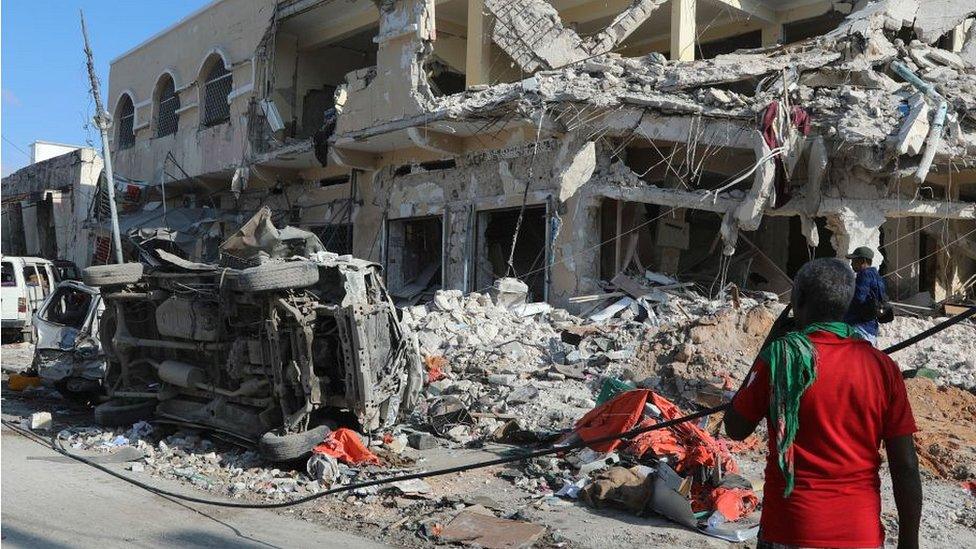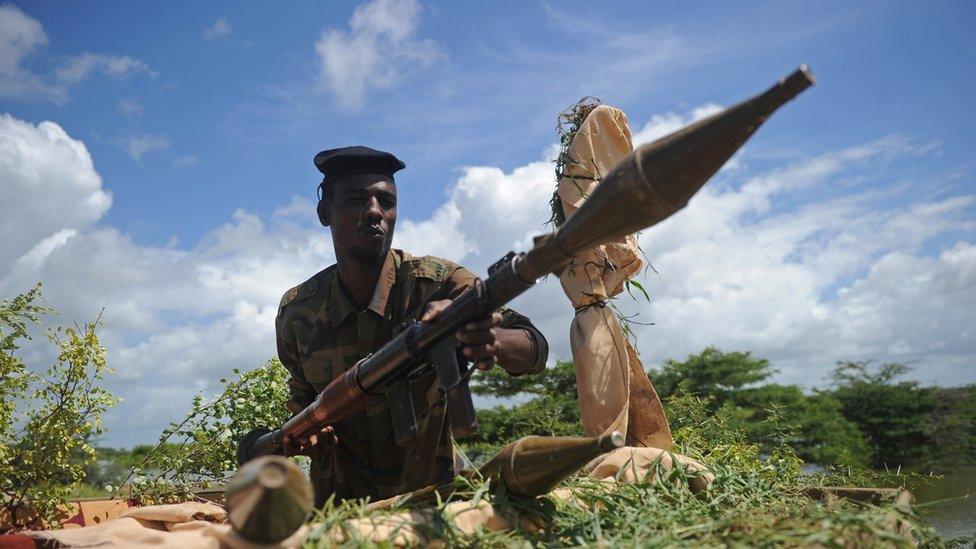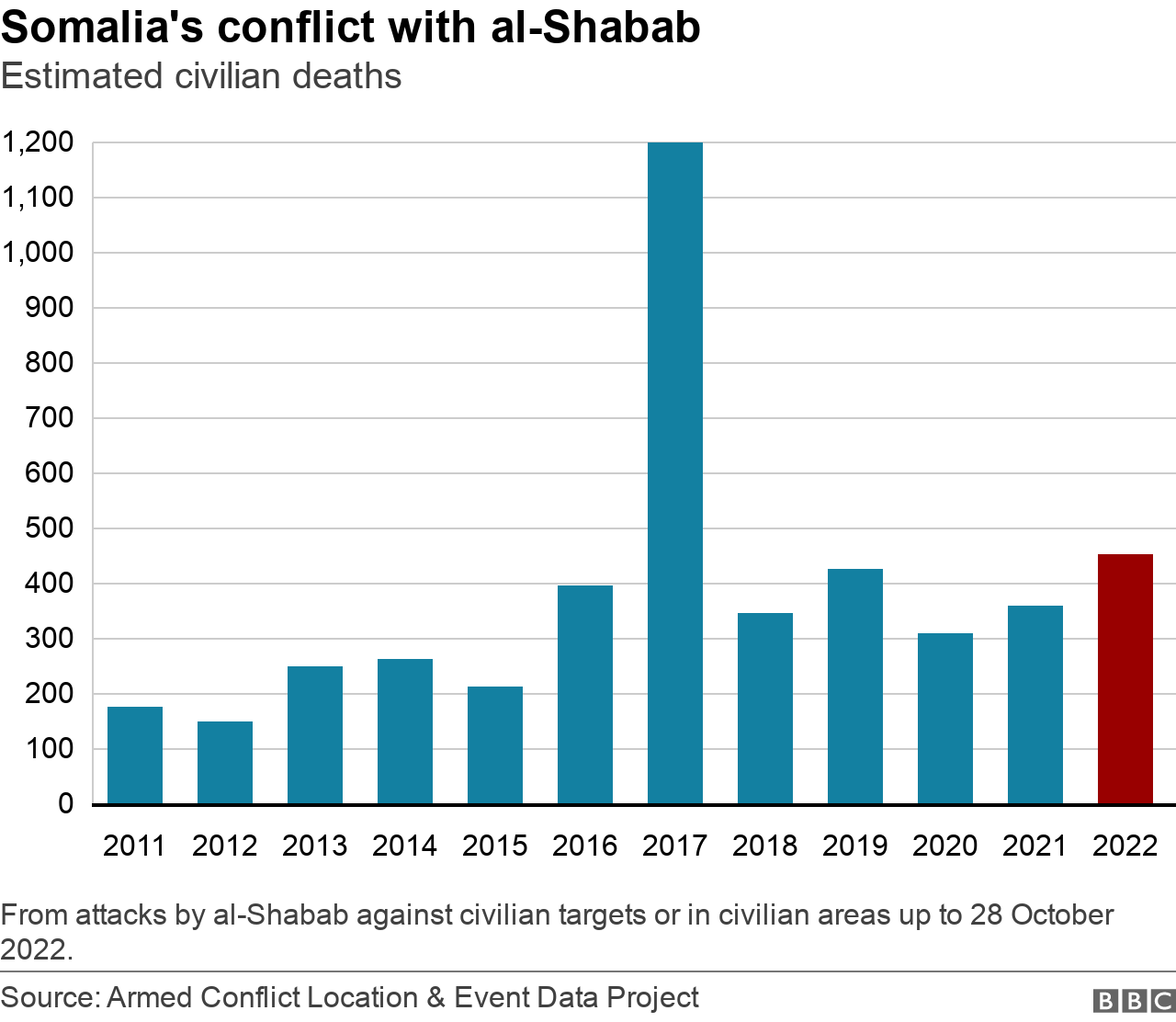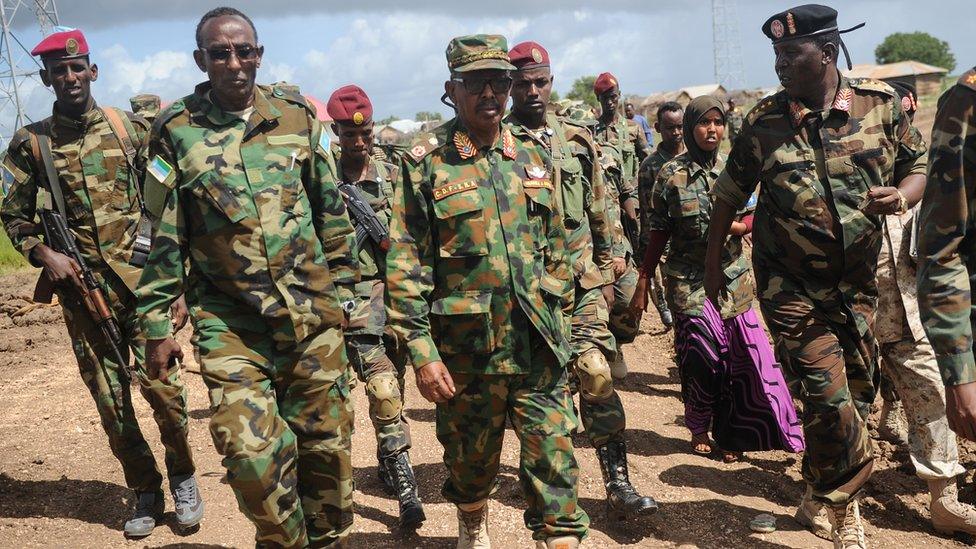Al-Shabab: Are militant attacks on the rise in Somalia?
- Published

The aftermath of the recent bomb attack in Mogadishu
Al-Shabab militants have carried out several attacks in Somalia in recent weeks, including twin car bomb explosions in the capital, Mogadishu in which 120 people died.
The Islamist group has been active in Somalia for more than 15 years. Are attacks increasing and are there more civilian casualties?
Government crackdown
In recent weeks, the government has launched a large-scale offensive against al-Shabab, working together with local clan militia.
President Hassan Sheikh Mohamud, who was re-elected in May, has pledged "total war" against the Islamist militants after they attacked a popular hotel in Mogadishu in August, killing at least 21 people.
And government forces have been gaining ground, according to analysts.

Somali government forces have gone on the offensive against al-Shabab
"The bombings were a message sent by the militants to show that they are still alive, despite the fact that they were defeated...by government forces," President Mohamud said of the recent attacks in Mogadishu.
Horn of Africa analyst Rashid Abdi says al-Shabab could be carrying out more attacks as a response to its losses., external
"No surprise Al-Shabab is more lethal now. Its back is to the wall. It has lost more territory in four months than it has in five years.
"It is facing most serious clan revolt ever. Its economic empire [is] under strain,"
The US embassy in Mogadishu has also suggested the recent attacks could be connected to battlefield losses, external.
How active is al-Shabab now?
In recent years, the group has changed its approach from direct military confrontation, to tactics such as bombings, raids and assassinations of Somali and foreign officials.
It has also continued to be successful in generating revenue from local clans, collecting taxes and running courts outside government-controlled areas.
President Mohamud says the group has 15,000 to 18,000 fighters, and UN experts say it has a monthly revenue of about $10m (£8.7m).

The Somali government doesn't publish statistics on killings by militant groups.
However, the Armed Conflict Location & Event Data Project (Acled), external collects data on attacks by al-Shabab as well as by government and foreign forces against militant targets.
Their information indicates 2022 is on course to be one of the worst years on record for fatalities. The number so far this year is above that recorded for 2020 and 2021.
In 2017, more than 500 people were killed in one attack in Mogadishu. The government attributed this to al-Shabab, although the group did not confirm it was behind it.

The militant group still retains control over large areas of rural Somalia and continues to mount attacks in urban centres.
ACLED figures for all fatalities show that this year, conflict was concentrated in central and southern regions, including Mogadishu, the capital, and surrounding areas.
There have been a few attacks in the north of the country, and to the north-east, some groups loyal to the so-called Islamic State are active.
However, Islamic State operates on a much smaller scale.
Are foreign forces fighting in Somalia?
Various international players have participated in the fight against the group, the key one being the US, which decided earlier this year to send troops back to the country.
Last month, the Biden administration also announced that it had blacklisted 14 individuals, external it accused of being leaders or financiers of al-Shabab.

Somali's national army has been aided by US military intervention
During President Trump's administration, the US significantly increased the use of airstrikes and drones to combat the militants. But it then withdrew troops in December 2020 following strained relations with then president Mohamed Abdullahi Mohamed "Farmajo".
The African Union Transition Mission in Somalia (ATMIS) has also been supporting the country's army against the militants, having taken over from the African Union Mission in Somalia (AMISOM) earlier this year.
Kenya has had troops fighting al-Shabab in Somalia since 2011 and the group has carried out frequent attacks.
In January 2019, 21 people were killed during a raid on the DusitD2 hotel complex in the capital, Nairobi.
The group's deadliest attack on Kenyan soil was in April 2015 when gunmen attacked Garissa University College in eastern Kenya killing 148 people, most of them students.
The International Crisis Group says "the renewed mobilisation against al-Shabab carries risks of increased violence against civilians with little prospects of full military victory on either side."
Additional research by Erwan Rivault

